北师大版(2019)选择性必修第二册 Unit 4 Humour Lesson 2 What’s So Funny精品课堂5(共25张PPT)
文档属性
| 名称 | 北师大版(2019)选择性必修第二册 Unit 4 Humour Lesson 2 What’s So Funny精品课堂5(共25张PPT) |  | |
| 格式 | pptx | ||
| 文件大小 | 623.1KB | ||
| 资源类型 | 教案 | ||
| 版本资源 | 北师大版(2019) | ||
| 科目 | 英语 | ||
| 更新时间 | 2023-03-16 15:40:27 | ||
图片预览

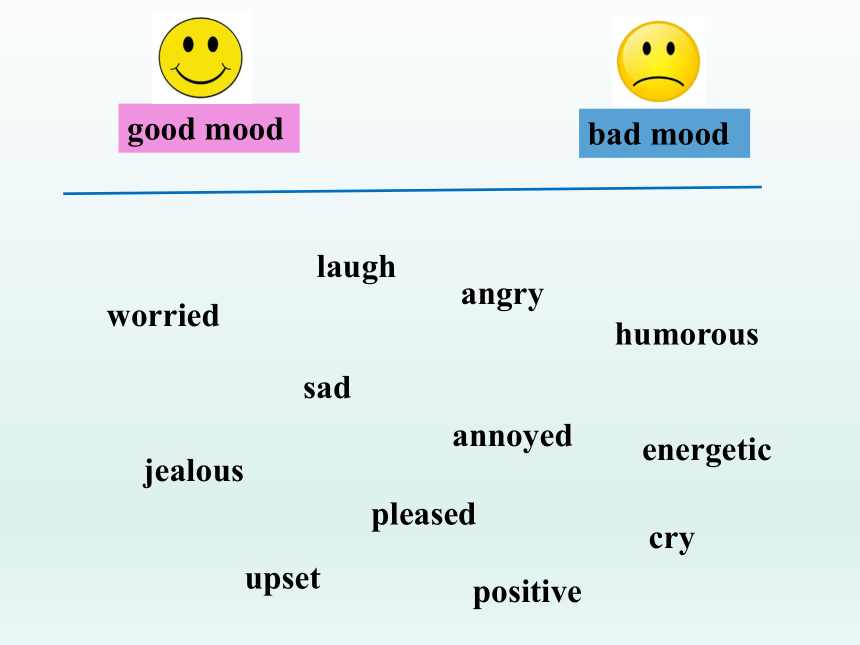
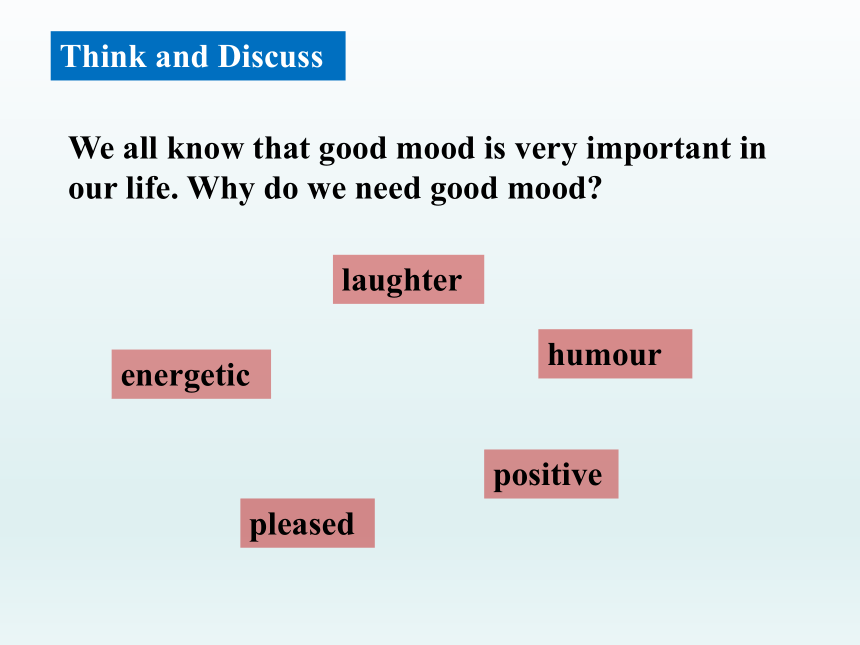
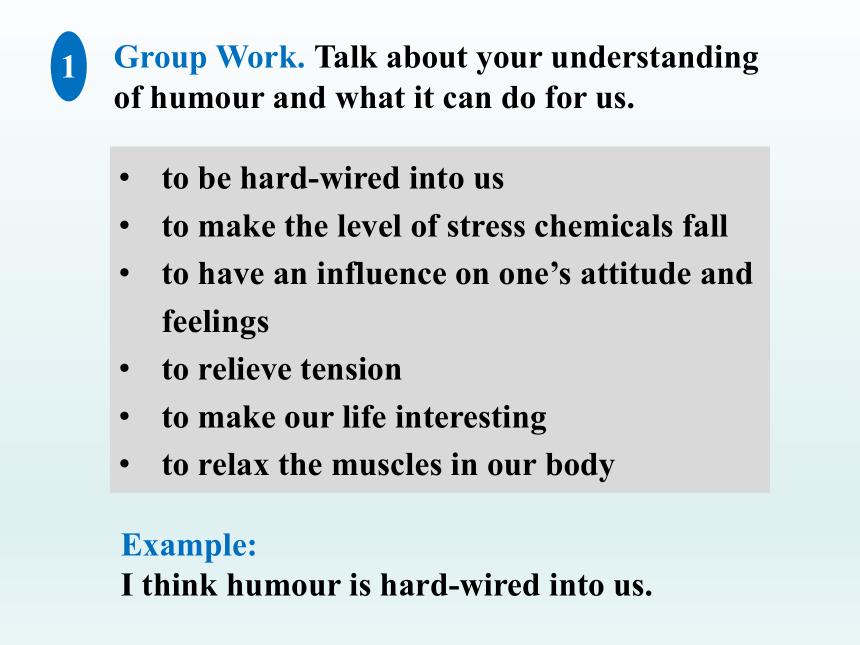
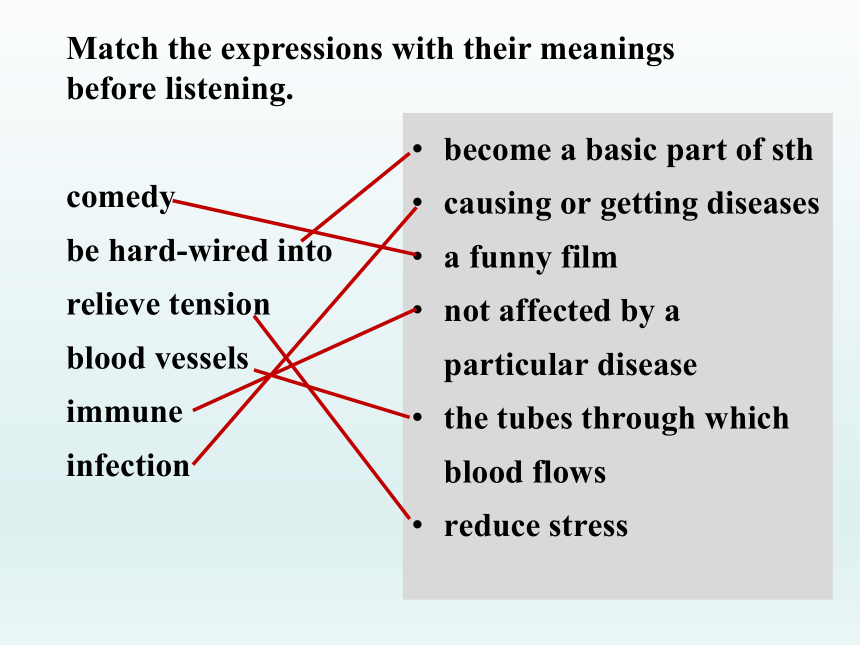
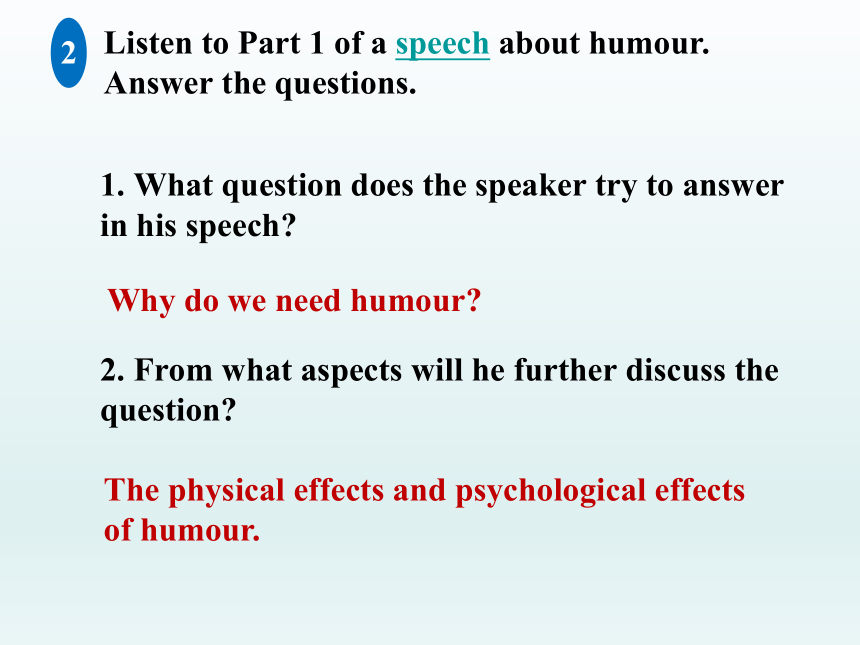
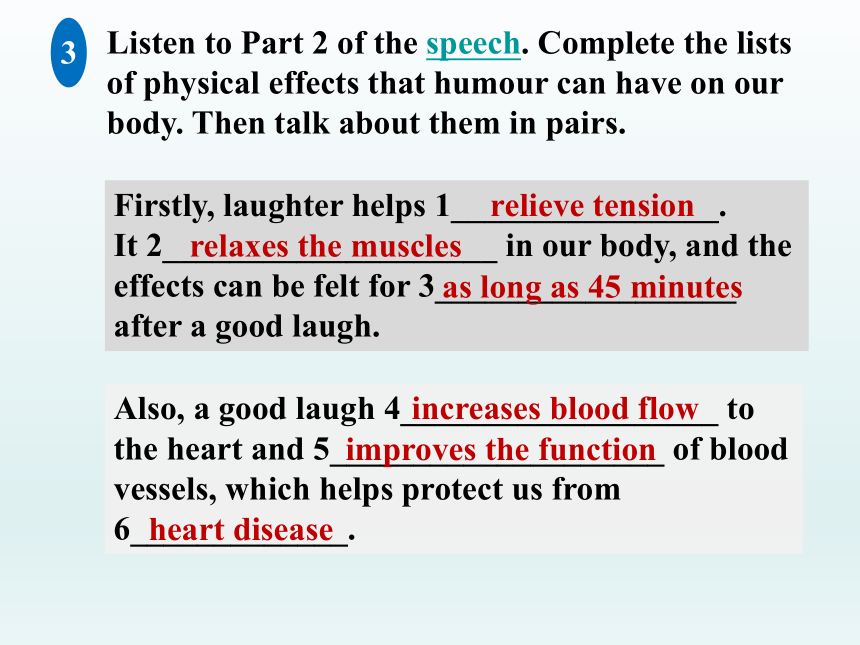
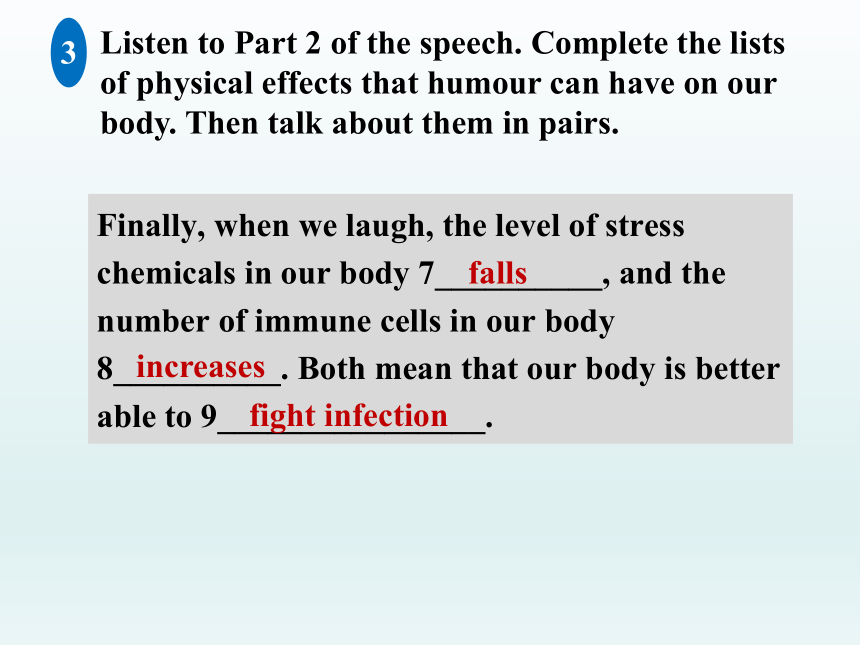

文档简介
(共25张PPT)
Lesson 2
Unit 4 HUMOUR
good mood
bad mood
laugh
cry
sad
angry
annoyed
jealous
pleased
humorous
worried
upset
positive
energetic
We all know that good mood is very important in our life. Why do we need good mood
Think and Discuss
laughter
pleased
positive
humour
energetic
1
Group Work. Talk about your understanding of humour and what it can do for us.
to be hard-wired into us
to make the level of stress chemicals fall
to have an influence on one’s attitude and feelings
to relieve tension
to make our life interesting
to relax the muscles in our body
Example:
I think humour is hard-wired into us.
comedy
be hard-wired into
relieve tension
blood vessels
immune
infection
become a basic part of sth
causing or getting diseases
a funny film
not affected by a particular disease
the tubes through which blood flows
reduce stress
Match the expressions with their meanings before listening.
2
Listen to Part 1 of a speech about humour. Answer the questions.
1. What question does the speaker try to answer in his speech
2. From what aspects will he further discuss the question
Why do we need humour
The physical effects and psychological effects of humour.
3
Listen to Part 2 of the plete the lists of physical effects that humour can have on our body. Then talk about them in pairs.
Firstly, laughter helps 1________________.
It 2____________________ in our body, and the effects can be felt for 3__________________ after a good laugh.
relieve tension
relaxes the muscles
as long as 45 minutes
Also, a good laugh 4___________________ to the heart and 5____________________ of blood vessels, which helps protect us from 6_____________.
increases blood flow
improves the function
heart disease
Finally, when we laugh, the level of stress chemicals in our body 7__________, and the number of immune cells in our body 8__________. Both mean that our body is better able to 9________________.
3
Listen to Part 2 of the plete the lists of physical effects that humour can have on our body. Then talk about them in pairs.
falls
increases
fight infection
4
Listen to Part 3. Complete the information about the two psychological effects of humour on our mind.
The two-way effect between smiling and mood:
When we’re happy,
________________
we naturally smile.
When we smile, even if we don’t feel like it, it can also ____________________.
________________
make us feel happy.
4
Listen to Part 3. Complete the information about the two psychological effects of humour on our mind.
Far-reaching effects of humour:
It means that it will have a ______________ on how we live. If we are in a bad mood, we are likely to express __________________________; and this makes those around us down, too. But if we always try to be positive and funny, people will __________________ and feel energised.
great influence
negative attitudes and feelings
enjoy our company
Listen to the speech again. Write down the questions that the speaker used in it. Then answer these questions and think about the reasons why the speaker uses questions in his speech and what kind of questions they are.
5
1. What can humour do for us
2. Does it mean there is a relation between smiling and mood
3. What does “far-reaching effects” mean
Humour has both physical and psychological effects.
YES. Humour also has psychological effects on our mind.
It means it will have a great influence on how we live.
Why does the speaker use questions in his speech
Some speakers use questions from time to time to draw the audience’s attention. Then they provide answers to the questions. In this way, it helps the audience to understand the points they are making.
Further thinking
Rhetorical questions in a speech
Definition: A rhetorical question is a question that’s asked for effect with no answer expected. The answer may be immediately provided by the questioner.
Function: Rhetorical questions can be used as an effective communication tool during a speech. These questions provide you with a way of controlling the speech and thoughts of the audience. They are especially useful in engaging the audience and getting the audience to actively participate rather than passively listen.
Read the summary of the speech and guess the meaning of the underlined words.
Mike got himself in a very awkward situation when he attended a party. He was so embarrassed that his face blushed. However, he managed to find a very clever way to handle it and saved his face eventually.
6
Listen to a dialogue and find out Mike’s embarrassing situation and his way to handle it.
1. Mike’s embarrassing situation:
He kept on __________________________.
2. His way to handle the situation:
He used __________________________________.
He just started laughing and said, “Oh dear, one of these days I’m going to
______________________!”
getting the host’s name wrong
a joke about himself to solve the embarrassments.
forget my own name
3. Where did Mike get the idea of using humour to solve the embarrassments
4. According to Mike, why is humour a great way to deal with an awkward situation
He got the idea from an article he recently read.
Because humour can make people laugh and
laughter is a great way to make people feel
comfortable in an awkward situation.
7
Listen and plete the Talk Builder.
Elaborating with Examples
For example, For instance, One example of this
__________________ is that you can use humour to get people to laugh at you.
____________, if you accidentally pour coffee all over yourself, you can laugh at yourself or make a joke about it.
You can say, ____________, “My T-shirt also wants to have a cup of coffee. ”
One example of this
For instance
for example
More ways to say “for example”
1. such as
2. let’s say …
3. examples include …
4. imagine that
5. in a similar case …
6. to illustrate …
7. to give you an idea …
8. suppose that …
8
Group Work. Talk about the benefits of humour based on your own or other people’s experience and elaborate with examples.
So what’s your opinion about the benefits of humour
新北师大选择性必修Book 2
Unit 4 HUMOUR
Language points P12-13
1. It’s almost as if humour is hard-wired into us.
hard-wired
adj. 基本的,固有的,无法改变的
例句:
Such metaphors would have been learned and hard-wired into our brains at a young age.
这些隐喻应该是我们在幼年时期学习并深深刻在我们脑海里的。
2. to have an influence on one’s attitudes and feelings.
influence n. 势力;权势;影响力;支配力
例句:
The government should use its influence for the release of all hostages.
政府应该利用其影响力来解救所有人质。
have an influence on... 有影响;起作用
例句:
Van Gogh had a major influence on the development of modern painting.
凡·高对现代绘画的发展有着重大影响。
2. to have an influence on one’s attitudes and feelings.
influence v. 影响;对……起作用
influence sb./sth.
例句:
His words influenced me deeply.
他的话深深地影响了我。
influence+从句
例句:
They still influence what’s played on the radio.
他们对电台播放什么节目仍然会有影响。
3. Besides, when we incorporate humour as part of our life attitude, it can have far-reaching effects.
incorporate v. 包含;吸收
例句:
The new cars will incorporate a number of major improvements.
新款汽车会有若干重大改进。
incorporate v. 合并;把……并入
incorporate...into...
例句:
The party vowed to incorporate environmental considerations into its policies.
该党宣誓要把环境因素纳入它的政策当中。
4. But I really embarrassed myself.
embarrass v. 使尴尬;使窘迫;使害羞
例句:
His clumsiness embarrassed himself.
他因自己的笨拙而感到尴尬。
embarrassed adj. 尴尬的;窘迫的;害羞的
例句:
He looked a bit embarrassed.
他看起来有点尴尬。
embarrassing
adj. 令人尴尬的;令人窘迫的;令人害羞的
例句:
That’s an embarrassing situation for me .
那种情形让我难堪。
Lesson 2
Unit 4 HUMOUR
good mood
bad mood
laugh
cry
sad
angry
annoyed
jealous
pleased
humorous
worried
upset
positive
energetic
We all know that good mood is very important in our life. Why do we need good mood
Think and Discuss
laughter
pleased
positive
humour
energetic
1
Group Work. Talk about your understanding of humour and what it can do for us.
to be hard-wired into us
to make the level of stress chemicals fall
to have an influence on one’s attitude and feelings
to relieve tension
to make our life interesting
to relax the muscles in our body
Example:
I think humour is hard-wired into us.
comedy
be hard-wired into
relieve tension
blood vessels
immune
infection
become a basic part of sth
causing or getting diseases
a funny film
not affected by a particular disease
the tubes through which blood flows
reduce stress
Match the expressions with their meanings before listening.
2
Listen to Part 1 of a speech about humour. Answer the questions.
1. What question does the speaker try to answer in his speech
2. From what aspects will he further discuss the question
Why do we need humour
The physical effects and psychological effects of humour.
3
Listen to Part 2 of the plete the lists of physical effects that humour can have on our body. Then talk about them in pairs.
Firstly, laughter helps 1________________.
It 2____________________ in our body, and the effects can be felt for 3__________________ after a good laugh.
relieve tension
relaxes the muscles
as long as 45 minutes
Also, a good laugh 4___________________ to the heart and 5____________________ of blood vessels, which helps protect us from 6_____________.
increases blood flow
improves the function
heart disease
Finally, when we laugh, the level of stress chemicals in our body 7__________, and the number of immune cells in our body 8__________. Both mean that our body is better able to 9________________.
3
Listen to Part 2 of the plete the lists of physical effects that humour can have on our body. Then talk about them in pairs.
falls
increases
fight infection
4
Listen to Part 3. Complete the information about the two psychological effects of humour on our mind.
The two-way effect between smiling and mood:
When we’re happy,
________________
we naturally smile.
When we smile, even if we don’t feel like it, it can also ____________________.
________________
make us feel happy.
4
Listen to Part 3. Complete the information about the two psychological effects of humour on our mind.
Far-reaching effects of humour:
It means that it will have a ______________ on how we live. If we are in a bad mood, we are likely to express __________________________; and this makes those around us down, too. But if we always try to be positive and funny, people will __________________ and feel energised.
great influence
negative attitudes and feelings
enjoy our company
Listen to the speech again. Write down the questions that the speaker used in it. Then answer these questions and think about the reasons why the speaker uses questions in his speech and what kind of questions they are.
5
1. What can humour do for us
2. Does it mean there is a relation between smiling and mood
3. What does “far-reaching effects” mean
Humour has both physical and psychological effects.
YES. Humour also has psychological effects on our mind.
It means it will have a great influence on how we live.
Why does the speaker use questions in his speech
Some speakers use questions from time to time to draw the audience’s attention. Then they provide answers to the questions. In this way, it helps the audience to understand the points they are making.
Further thinking
Rhetorical questions in a speech
Definition: A rhetorical question is a question that’s asked for effect with no answer expected. The answer may be immediately provided by the questioner.
Function: Rhetorical questions can be used as an effective communication tool during a speech. These questions provide you with a way of controlling the speech and thoughts of the audience. They are especially useful in engaging the audience and getting the audience to actively participate rather than passively listen.
Read the summary of the speech and guess the meaning of the underlined words.
Mike got himself in a very awkward situation when he attended a party. He was so embarrassed that his face blushed. However, he managed to find a very clever way to handle it and saved his face eventually.
6
Listen to a dialogue and find out Mike’s embarrassing situation and his way to handle it.
1. Mike’s embarrassing situation:
He kept on __________________________.
2. His way to handle the situation:
He used __________________________________.
He just started laughing and said, “Oh dear, one of these days I’m going to
______________________!”
getting the host’s name wrong
a joke about himself to solve the embarrassments.
forget my own name
3. Where did Mike get the idea of using humour to solve the embarrassments
4. According to Mike, why is humour a great way to deal with an awkward situation
He got the idea from an article he recently read.
Because humour can make people laugh and
laughter is a great way to make people feel
comfortable in an awkward situation.
7
Listen and plete the Talk Builder.
Elaborating with Examples
For example, For instance, One example of this
__________________ is that you can use humour to get people to laugh at you.
____________, if you accidentally pour coffee all over yourself, you can laugh at yourself or make a joke about it.
You can say, ____________, “My T-shirt also wants to have a cup of coffee. ”
One example of this
For instance
for example
More ways to say “for example”
1. such as
2. let’s say …
3. examples include …
4. imagine that
5. in a similar case …
6. to illustrate …
7. to give you an idea …
8. suppose that …
8
Group Work. Talk about the benefits of humour based on your own or other people’s experience and elaborate with examples.
So what’s your opinion about the benefits of humour
新北师大选择性必修Book 2
Unit 4 HUMOUR
Language points P12-13
1. It’s almost as if humour is hard-wired into us.
hard-wired
adj. 基本的,固有的,无法改变的
例句:
Such metaphors would have been learned and hard-wired into our brains at a young age.
这些隐喻应该是我们在幼年时期学习并深深刻在我们脑海里的。
2. to have an influence on one’s attitudes and feelings.
influence n. 势力;权势;影响力;支配力
例句:
The government should use its influence for the release of all hostages.
政府应该利用其影响力来解救所有人质。
have an influence on... 有影响;起作用
例句:
Van Gogh had a major influence on the development of modern painting.
凡·高对现代绘画的发展有着重大影响。
2. to have an influence on one’s attitudes and feelings.
influence v. 影响;对……起作用
influence sb./sth.
例句:
His words influenced me deeply.
他的话深深地影响了我。
influence+从句
例句:
They still influence what’s played on the radio.
他们对电台播放什么节目仍然会有影响。
3. Besides, when we incorporate humour as part of our life attitude, it can have far-reaching effects.
incorporate v. 包含;吸收
例句:
The new cars will incorporate a number of major improvements.
新款汽车会有若干重大改进。
incorporate v. 合并;把……并入
incorporate...into...
例句:
The party vowed to incorporate environmental considerations into its policies.
该党宣誓要把环境因素纳入它的政策当中。
4. But I really embarrassed myself.
embarrass v. 使尴尬;使窘迫;使害羞
例句:
His clumsiness embarrassed himself.
他因自己的笨拙而感到尴尬。
embarrassed adj. 尴尬的;窘迫的;害羞的
例句:
He looked a bit embarrassed.
他看起来有点尴尬。
embarrassing
adj. 令人尴尬的;令人窘迫的;令人害羞的
例句:
That’s an embarrassing situation for me .
那种情形让我难堪。
同课章节目录
- Unit 4 Humour
- Lesson 1 What’s So Funny?
- Lesson 2 Why Do We Need Humour?
- Lesson 3 My Favourite Comedian
- Unit 5 Education
- Lesson 1 Enlightening a Mind
- Lesson 2 The Objectives of Education
- Lesson 3 Understanding
- Unit 6 The Media
- Lesson 1 From Page to Screen
- Lesson 2 Questions about Media
- Lesson 3 The Advertising Game
